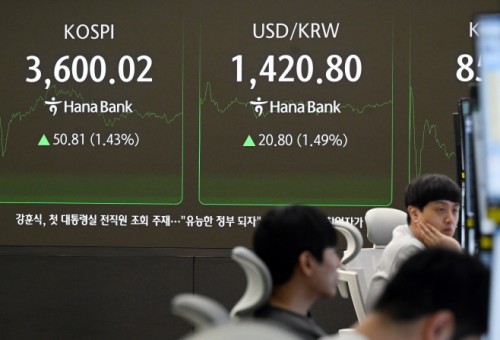 |
| Traders monitor the board at Hana Bank’s dealing room in Jung-gu, Seoul, on October 10, when the Kospi topped 3,600 for the first time and the won briefly weakened past 1,420 per dollar. / Source: Park Sang-seon |
Kospi pierced the 3,600 mark for the first time on October 10 on the back of surging semiconductor bellwethers, stoking both optimism and caution over whether the rally can continue. Strategists say an AI-driven upcycle should support equities over the medium term, but warn that the market could face a short-term pullback given frothy gains in chip names and lingering external uncertainties, including protracted U.S. shutdown risks and trade frictions.
According to the Korea Exchange on October 12, the Kospi closed at 3,610.60 on October 10, up 1.73% from the previous session after touching an intraday record of 3,617.86. The advance was led by Samsung Electronics and SK hynix as investors piled into beneficiaries of the U.S.-led AI semiconductor supercycle, underpinned by expanding capex from global big tech and rising demand for supporting infrastructure.
Expectations also firmed after Samsung Electronics and SK hynix said in early October they would participate—via a strategic partnership—in OpenAI’s $500 billion hyperscale data-center initiative “Stargate,” further brightening the earnings outlook for chipmakers. “Because the government–OpenAI collaboration entails tangible semiconductor demand, it is directly stoking profit-growth expectations across related industries,” said Jeong Hae-chang, analyst at Daishin Securities.
Foreign inflows have concentrated heavily in the sector. Since last month, 76% of net foreign purchases have gone into Samsung Electronics and SK hynix, supercharging semiconductor sentiment. SK hynix’s market capitalization has topped 300 trillion won, and together with Samsung—now nearing 560 trillion won—the two account for over 30% of the Kospi’s total value.
Even so, analysts caution that the Kospi may see near-term mean reversion as positioning remains crowded in a handful of chip leaders and investors lock in gains. The prolonged U.S. federal government shutdown adds another layer of uncertainty that could unsettle risk appetite.
“The shutdown’s delays to economic data and elevated political uncertainty, combined with concentrated flows into specific sectors, could trigger a short-term pullback,” said Han Ji-young, analyst at Kiwoom Securities. “The medium-term semiconductor momentum centered on AI remains intact, but with earnings already priced in, profit-taking pressures may surface.”
Trade dynamics and a weaker won are also set to deepen sector dispersion rather than deliver a new negative shock. With Washington’s tariff stance hardening, some Korean exporters—particularly in semiconductors, power equipment and shipbuilding—are viewed as relatively insulated “all-weather” plays and could extend their outperformance.
“Uncertainty has risen, but global liquidity and the AI bull theme should exert a stronger positive pull on the Kospi,” said Kim Jae-seung, analyst at Hyundai Motor Securities. “As protectionism intensifies, Korea’s semiconductor and shipbuilding sectors face limited tariff risk and boast strong export competitiveness, suggesting continued relative strength within the index.”
Most Read
-
1
-
2
-
3
-
4
-
5
-
6
-
7





















